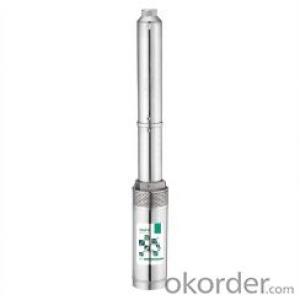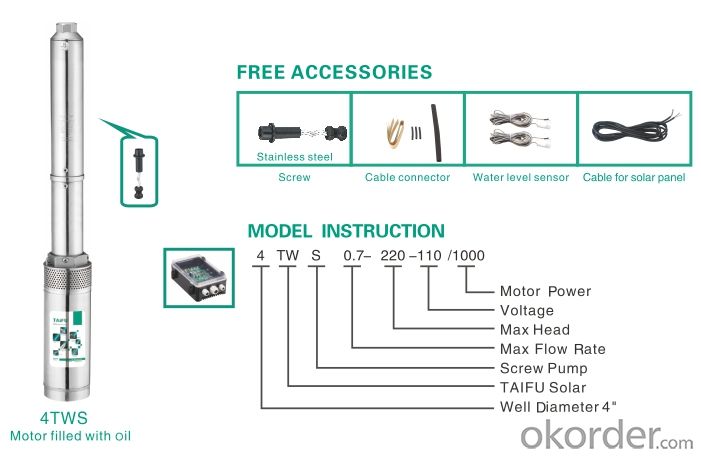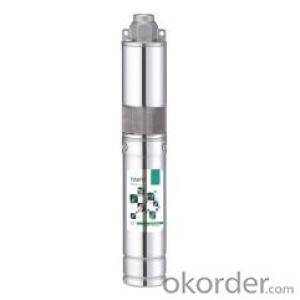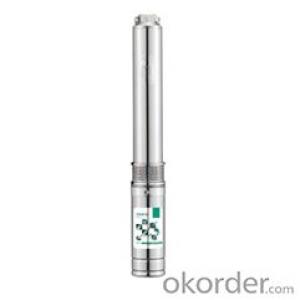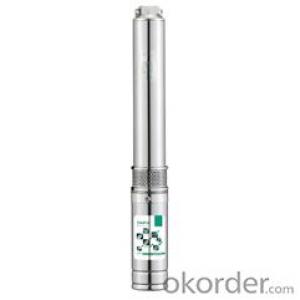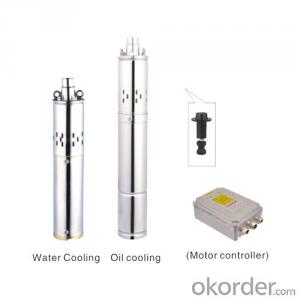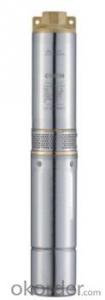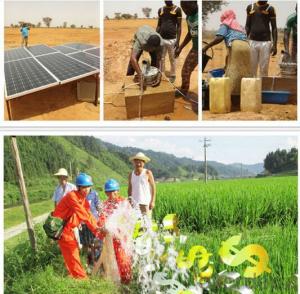Cheap Solar Pump 4TWS Solar Pump Stainless Steel CE, Solar Panel
- Loading Port:
- Shanghai
- Payment Terms:
- TT OR LC
- Min Order Qty:
- 50 pc
- Supply Capability:
- 100000 pc/month
OKorder Service Pledge
OKorder Financial Service
You Might Also Like
1.APPLICATION AREA:This project products are mainly used in dry region for irrigation of agriculture, It can be used for drinking water and
living water. The living condition could be much improved. It also can be used for fountains.2.MATERIAL OF PARTS:Outlet: stainless steel
Pump body: stainless steel
Motor body: stainless steel
Bearing: C&U
3.ADVANCED TECHNOLOGY:1.Application innovation
Compared with the traditional alternating current machine, the efficiency is improved 25% by the permanent magnetism, direct current, brushless, non-sensor motor.
2.Technics innovation
Adopt double plastic package for rotor and stator, motor insulation≥300MΩ, the motor security was much improved.
3.Structure innovation
Oil filling, convenient installation and environmental protection4.HIGHLIGHTSa.Energy-saving and environment-protected green products
b.High technique products adopting MPPT and DSP chip technique.
c.100% copper wire, cold-rolled silicon steel sheet
d.CE certificate
e.Advanced three phase brushless DC motor
f.Stainless steel 316 screws
g.3 years warranty5.PRINCIPLE OF OPERATION:Solar panel collects sunlight→DC electricity energy → solar controller(rectification,stabilization,amplification,filtering)→available DC electricity→(charge the batteries)→pumping water6.ADVANTAGES OF SOLAR PUMP SYSTEM:A.It is easier and more widely used than any other dynamoelectric driven pumps.
B.It is more economical and more environmentally friendly.7.MODEL SELECTION:a.The power of solar panel = power of pump ×1.3
The voltage of solar panel = the voltage of pump
The controller should be matched
b.Select the batteries according to the following formulas:
The use hour of battery =
The battery capacity ÷(the machine power÷the battery voltage)×0.6 For example,the machine power is 200W, the battery
capacity is 100AH,the voltage is 12V,and the battery is fully charged,then the use hour is:100÷(200÷12)×0.6=3.6hours
c.The battery capacity=
the use hour ÷0.6×(the machine power÷the battery voltage) For example,the machine power is 200W,the battery voltage
is 12V,and the battery need to be used for 3.6hours,then the battery capacity is:3.6÷0.6×(200÷12)=100AH

- Q: Can a solar pump be used for water supply in electronics or semiconductor manufacturing?
- No, a solar pump cannot be used for water supply in electronics or semiconductor manufacturing as the water quality and purity requirements in these industries are very high. Specialized water treatment and purification systems are necessary, which cannot be provided by a solar pump alone.
- Q: Can a solar pump be used for water supply in wildlife sanctuaries or conservation areas?
- Certainly! In wildlife sanctuaries or conservation areas, one can utilize a solar pump for water supply. These pumps present a sustainable and eco-friendly alternative to traditional pumps, which depend on fossil fuels or grid electricity. By harnessing solar energy, they power the pump, ensuring a constant and reliable water supply without causing harm to the environment or disturbing the natural habitat of the wildlife. Since solar pumps can be installed in remote or off-grid locations, they are highly suitable for wildlife sanctuaries or conservation areas that lack access to conventional electricity sources. Furthermore, solar pumps necessitate minimal maintenance and boast a lengthy lifespan, making them a cost-effective and efficient solution for delivering water to the wildlife in these protected regions.
- Q: Can a solar pump be used for water supply in mining or construction sites?
- Yes, a solar pump can be used for water supply in mining or construction sites. Solar pumps are especially suitable for remote locations where access to electricity is limited. They can effectively extract and transport water from various sources such as wells, rivers, or ponds, providing a reliable and sustainable water supply for mining or construction operations. Additionally, solar pumps are cost-effective, environmentally friendly, and require minimal maintenance, making them a suitable choice for these types of sites.
- Q: Can a solar pump be used for water circulation in fish tanks?
- Indeed, water circulation in fish tanks can be achieved with the utilization of a solar pump. Specifically engineered to operate solely on solar energy, these pumps eradicate the necessity for electricity, resulting in diminished energy expenditures. Their ability to furnish a consistent stream of water ensures adequate circulation and oxygenation for the fish. Moreover, solar pumps exhibit an eco-friendly disposition, as they abstain from emitting any detrimental substances, thereby constituting a sustainable option for fish tank proprietors. Nonetheless, it remains imperative to ascertain that the solar pump is suitable for the dimensions of the fish tank and the distinct requirements of the fish species.
- Q: Can a solar pump be used in areas with limited access to training programs for maintenance?
- Yes, a solar pump can be used in areas with limited access to training programs for maintenance. Solar pumps are relatively simple and require minimal maintenance compared to traditional pumps. They are designed to be user-friendly and often come with easy-to-follow instructions. Additionally, there are online resources and tutorials available that can assist individuals in understanding basic maintenance procedures. In some cases, manufacturers also provide after-sales support or remote assistance to troubleshoot any issues that may arise. Overall, while access to training programs for maintenance would be beneficial, it is still possible to use a solar pump effectively in areas with limited access to such programs.
- Q: Can a solar pump be installed on a floating platform for water bodies?
- Indeed, it is possible to install a solar pump on a floating platform in water bodies. Floating solar pumps present an eco-friendly and innovative approach to water pumping in lakes, ponds, reservoirs, and similar locations. These pumps utilize solar energy to power the motor, which in turn draws water from the body of water and transfers it to the desired destination. Floating platforms serve as a stable foundation for the solar panels and pump, allowing for easy installation and maintenance access. The floating design also ensures that the solar panels are strategically positioned to receive optimal sunlight throughout the day, thereby maximizing the pump's efficiency. By installing a solar pump on a floating platform, several advantages can be attained. Firstly, it eliminates the necessity for costly and environmentally harmful infrastructure like pipelines or power lines. Moreover, it diminishes reliance on fossil fuels, thereby providing a clean and sustainable solution for water pumping. Additionally, floating solar pumps typically require minimal maintenance due to their fewer moving parts and absence of fuel requirements. The utilization of a floating platform also minimizes the impact on the water body itself. This approach avoids disruption to the natural ecosystem and reduces the risk of harm to aquatic life, as the floating platform can be easily relocated or adjusted as needed. In conclusion, a solar pump can indeed be installed on a floating platform in water bodies. This installation offers a sustainable, cost-effective, and environmentally friendly solution for water pumping, making it an ideal choice for various purposes such as irrigation, water supply, and aquaculture.
- Q: How does a solar pump help in reducing the use of genetically modified crops?
- A solar pump helps in reducing the use of genetically modified crops by providing sustainable and cost-effective irrigation solutions. By utilizing solar energy to power the pump, farmers can access a reliable water source for irrigation purposes without relying on expensive and environmentally harmful methods such as diesel pumps. This enables farmers to grow crops using natural water sources instead of genetically modified seeds that are often engineered to withstand drought or other adverse conditions. Therefore, the use of solar pumps promotes the cultivation of traditional, non-genetically modified crops, contributing to a reduction in the reliance on genetically modified crops.
- Q: Can a solar pump be used for rainwater harvesting?
- Yes, a solar pump can be used for rainwater harvesting. Solar pumps are highly efficient in converting solar energy into mechanical energy to pump water. This makes them an ideal choice for rainwater harvesting systems as they can extract and store rainwater for various uses such as irrigation, domestic purposes, or even groundwater recharge. Additionally, solar pumps are environmentally friendly and cost-effective in the long run, making them a sustainable option for rainwater harvesting.
- Q: Can solar pumps be used in conjunction with existing water systems?
- Yes, solar pumps can be used in conjunction with existing water systems. They can be integrated into the existing infrastructure to provide alternative and sustainable energy for water pumping, reducing reliance on grid electricity or fuel-powered pumps. This integration can help minimize costs, increase efficiency, and promote environmentally friendly water management practices.
- Q: Can solar pumps operate at night or on cloudy days?
- No, solar pumps cannot operate at night or on cloudy days as they rely on sunlight to generate the energy required for operation.
Send your message to us
Cheap Solar Pump 4TWS Solar Pump Stainless Steel CE, Solar Panel
- Loading Port:
- Shanghai
- Payment Terms:
- TT OR LC
- Min Order Qty:
- 50 pc
- Supply Capability:
- 100000 pc/month
OKorder Service Pledge
OKorder Financial Service
Similar products
Hot products
Hot Searches
Related keywords
